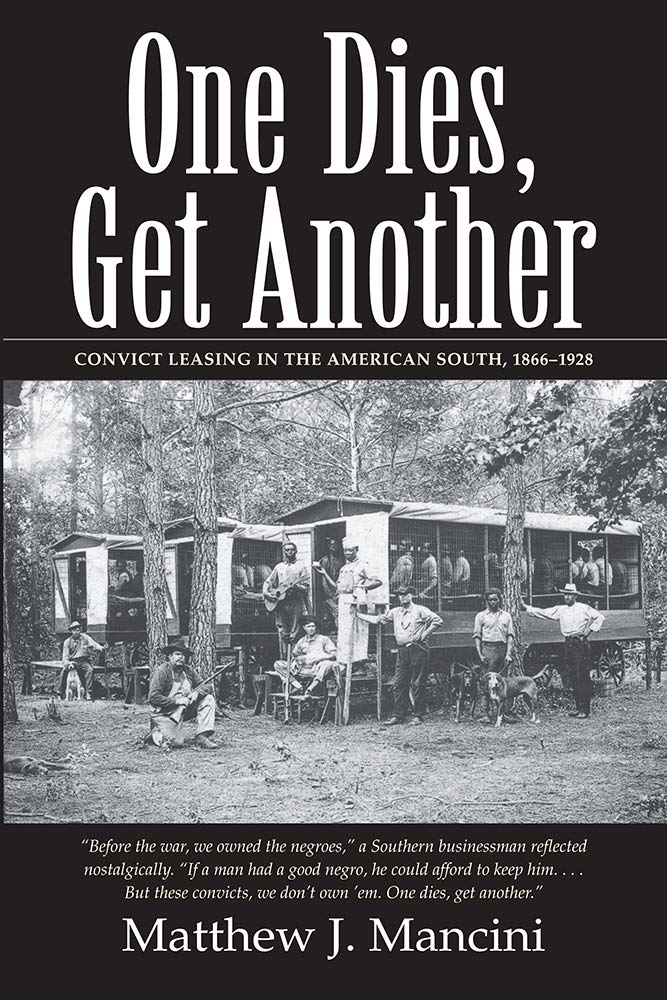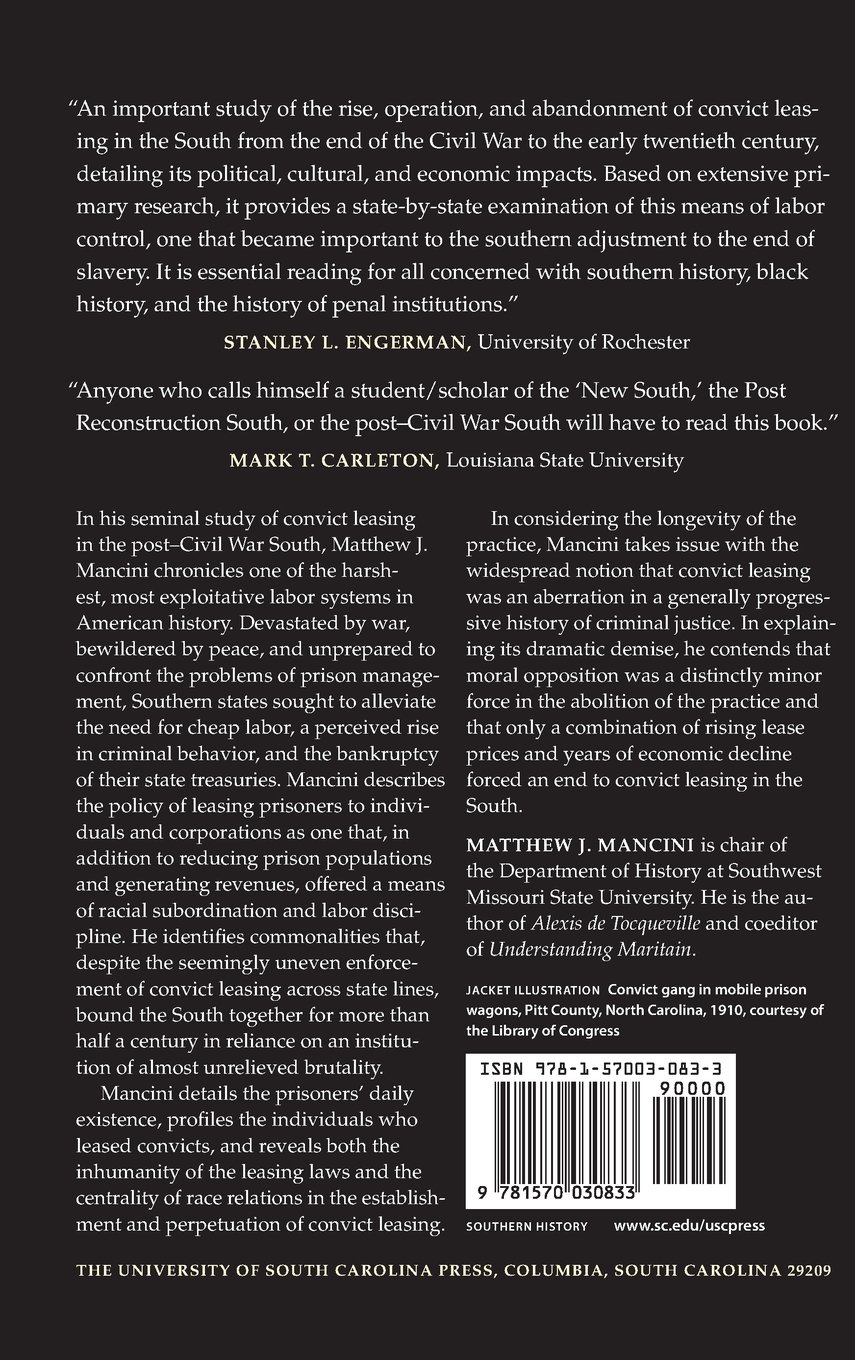-
 Thanh toán đa dạng, linh hoạtChuyển khoản ngân hàng, thanh toán tại nhà...
Thanh toán đa dạng, linh hoạtChuyển khoản ngân hàng, thanh toán tại nhà... -
 Miễn Phí vận chuyển 53 tỉnh thànhMiễn phí vận chuyển đối với đơn hàng trên 1 triệu
Miễn Phí vận chuyển 53 tỉnh thànhMiễn phí vận chuyển đối với đơn hàng trên 1 triệu -
 Yên Tâm mua sắmHoàn tiền trong vòng 7 ngày...
Yên Tâm mua sắmHoàn tiền trong vòng 7 ngày...
One Dies, Get Another: Convict Leasing in the American South, 1866-1928
-

- Mã sản phẩm: 1570030839
- (17 nhận xét)

- Publisher:University of South Carolina Press (April 1, 1996)
- Language:English
- Hardcover:296 pages
- ISBN-10:1570030839
- ISBN-13:978-1570030833
- Item Weight:1.25 pounds
- Dimensions:5.98 x 0.69 x 9.02 inches
- Best Sellers Rank:#849,395 in Books (See Top 100 in Books) #3,693 in Criminology (Books) #3,817 in Discrimination & Racism #15,693 in U.S. State & Local History
- Customer Reviews:4.4 out of 5 stars 17Reviews

Mô tả sản phẩm
Product Description
A chronicle one of the harshest, most exploitative labor systems in American history
In his seminal study of convict leasing in the post-Civil War South, Matthew J. Mancini chronicles one of the harshest, most exploitative labor systems in American history. Devastated by war, bewildered by peace, and unprepared to confront the problems of prison management, Southern states sought to alleviate the need for cheap labor, a perceived rise in criminal behavior, and the bankruptcy of their state treasuries. Mancini describes the policy of leasing prisoners to individuals and corporations as one that, in addition to reducing prison populations and generating revenues, offered a means of racial subordination and labor discipline. He identifies commonalities that, despite the seemingly uneven enforcement of convict leasing across state lines, bound the South together for more than half a century in reliance on an institution of almost unrelieved brutality.
He describes the prisoners' daily existence, profiles the individuals who leased convicts, and reveals both the inhumanity of the leasing laws and the centrality of race relations in the establishment and perpetuation of convict leasing.
In considering the longevity of the practice, Mancini takes issue with the widespread notion that convict leasing was an aberration in a generally progressive history of criminal justice. In explaining its dramatic demise, Mancini contends that moral opposition was a distinctly minor force in the abolition of the practice and that only a combination of rising lease prices and years of economic decline forced an end to convict leasing in the South.
Review
"Anyone who calls himself a student/scholar of the 'New South,' the Post Reconstruction South, or the post-Civil War South will have to read this book."―Mark T. Carleton, Louisiana State University
"An important study of the rise, operation, and abandonment of convict leasing in the South from the end of the Civil War to the early twentieth century, detailing its political, cultural, and economic impacts. Based on extensive primary research, it provides a state-by-state examination of this means of labor control, one that became important to the southern adjustment to the end of slavery. It is essential reading for all concern with southern history, black history, and the history of penal institutions."―Stanley L. Engerman, University of Rochester
From the Back Cover
In his seminal study of convict leasing in the post-Civil War South, Matthew J. Mancini chronicles one of the harshest, most exploitative labor systems in American history. Devastated by war, bewildered by peace, and unprepared to confront the problems of prison management, Southern states sought to alleviate the need for cheap labor, a perceived rise in criminal behavior, and the bankruptcy of their state treasuries. Mancini describes the policy of leasing prisoners to individuals and corporations as one that, in addition to reducing prison populations and generating revenues, offered a means of racial subordination and labor discipline. He identifies commonalities that, despite the seemingly uneven enforcement of convict leasing across state lines, bound the South together for more than half a century in reliance on an institution of almost unrelieved brutality. He describes the prisoners' daily existence, profiles the individuals who leased convicts, and reveals both the inhumanity of the leasing laws and the centrality of race relations in the establishment and perpetuation of convict leasing. In considering the longevity of the practice, Mancini takes issue with the widespread notion that convict leasing was an aberration in a generally progressive history of criminal justice. In explaining its dramatic demise, Mancini contends that moral opposition was a distinctly minor force in the abolition of the practice and that only a combination of rising lease prices and years of economic decline forced an end to convict leasing in the South.
About the Author
Matthew J. Mancini is chair of the Department of History at Southwest Missouri State University. He is the author of Alexis de Tocqueville and coeditor of Understanding Maritain.
- Mua astaxanthin uống có tốt không? Mua ở đâu? 29/10/2018
- Saffron (nhụy hoa nghệ tây) uống như thế nào cho hợp lý? 29/09/2018
- Saffron (nghệ tây) làm đẹp như thế nào? 28/09/2018
- Giải đáp những thắc mắc về viên uống sinh lý Fuji Sumo 14/09/2018
- Công dụng tuyệt vời từ tinh chất tỏi với sức khỏe 12/09/2018
- Mua collagen 82X chính hãng ở đâu? 26/07/2018
- NueGlow mua ở đâu giá chính hãng bao nhiêu? 04/07/2018
- Fucoidan Chính hãng Nhật Bản giá bao nhiêu? 18/05/2018
- Top 5 loại thuốc trị sẹo tốt nhất, hiệu quả với cả sẹo lâu năm 20/03/2018
- Footer chi tiết bài viết 09/03/2018
- Mã vạch không thể phân biệt hàng chính hãng hay hàng giả 10/05/2023
- Thuốc trắng da Ivory Caps chính hãng giá bao nhiêu? Mua ở đâu? 08/12/2022
- Nên thoa kem trắng da body vào lúc nào để đạt hiệu quả cao? 07/12/2022
- Tiêm trắng da toàn thân giá bao nhiêu? Có an toàn không? 06/12/2022
- Top 3 kem dưỡng trắng da được ưa chuộng nhất hiện nay 05/12/2022
- Uống vitamin C có trắng da không? Nên uống như thế nào? 03/12/2022
- [email protected]
- Hotline: 0909977247
- Hotline: 0908897041
- 8h - 17h Từ Thứ 2 - Thứ 7
Đăng ký nhận thông tin qua email để nhận được hàng triệu ưu đãi từ Muathuoctot.com
Tạp chí sức khỏe làm đẹp, Kem chống nắng nào tốt nhất hiện nay Thuoc giam can an toan hiện nay, thuoc collagen, thuoc Dong trung ha thao , thuoc giam can LIC, thuoc shark cartilage thuoc collagen youtheory dau ca omega 3 tot nhat, dong trung ha thao aloha cua my, kem tri seo hieu qua, C ollagen shiseido enriched, và collagen shiseido dạng viên , Collagen de happy ngăn chặn quá trình lão hóa, mua hang tren thuoc virility pills vp-rx tri roi loan cuong duong, vitamin e 400, dieu tri bang thuoc fucoidan, kem chống nhăn vùng mắt, dịch vụ giao hang nhanh nội thành, crest 3d white, fine pure collagen, nên mua collagen shiseido ở đâu, làm sáng mắt, dịch vụ cho thue kho lẻ tại tphcm, thực phẩm tăng cường sinh lý nam, thuoc prenatal bổ sung dinh dưỡng, kem đánh răng crest 3d white, hỗ trợ điều trị tim mạch, thuốc trắng da hiệu quả giúp phục hồi da. thuốc mọc tóc biotin
























 KHUYẾN MÃI LỚN
KHUYẾN MÃI LỚN Hỗ Trợ Xương Khớp
Hỗ Trợ Xương Khớp Bổ Não & Tăng cường Trí Nhớ
Bổ Não & Tăng cường Trí Nhớ Bổ Sung Collagen & Làm Đẹp
Bổ Sung Collagen & Làm Đẹp Bổ Thận, Mát Gan & Giải Độc
Bổ Thận, Mát Gan & Giải Độc Chăm Sóc Sức khỏe Nam Giới
Chăm Sóc Sức khỏe Nam Giới Chăm Sóc Sức khỏe Nữ Giới
Chăm Sóc Sức khỏe Nữ Giới Chăm sóc Sức khỏe Trẻ Em
Chăm sóc Sức khỏe Trẻ Em Thực Phẩm Giảm Cân, Ăn Kiêng
Thực Phẩm Giảm Cân, Ăn Kiêng Bổ Sung Vitamin & Khoáng Chất
Bổ Sung Vitamin & Khoáng Chất Bổ Tim Mạch, Huyết Áp & Mỡ Máu
Bổ Tim Mạch, Huyết Áp & Mỡ Máu Bổ Mắt & Tăng cường Thị lực
Bổ Mắt & Tăng cường Thị lực Điều Trị Tai Mũi Họng
Điều Trị Tai Mũi Họng Sức Khỏe Hệ Tiêu hóa
Sức Khỏe Hệ Tiêu hóa Chăm Sóc Răng Miệng
Chăm Sóc Răng Miệng Chống Oxy Hóa & Tảo Biển.
Chống Oxy Hóa & Tảo Biển.